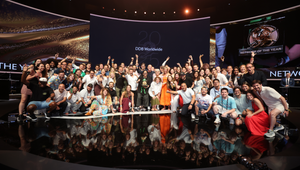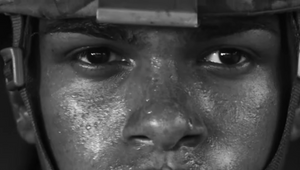
5 Minutes with… Varsha Kaura

Varsha Kaura is DDB’s global client lead for Mars. Tasked with delivering future-facing, data-driven creative solutions to Mars Incorporated, Varsha is focused on leveraging new data and insight platforms and capabilities integrated into these respective agencies.
Varsha's relentless pursuit of results for her clients and positive change for adland led to her actually stepping away from advertising for a period. In 2017, she left a 10-year tenure at Leo Burnett for Motista, a Silicon Valley predictive intelligence start-up.
The lessons she learned in how to leverage data and technology, combined with her experience in great brand building, all feed into what she does now with DDB and the wider Omnicom Group.
LBB's Addison Capper chatted with her about that and more.
LBB> You're the global business director at DDB for its Mars Incorporated business, which, given the size of that business, is a pretty huge role. Tell us a bit about it and what it entails.
Varsha> I lead the Omnicom group (DDB, BBDO, OPMG included) for Mars Wrigley while continuing to be the DDB lead for Mars Pet and Royal Canin globally. It’s a delightful, empowering and brilliant job. It makes my brain light up, since we are on a transformation journey with our clients.
I have three main focus areas. One is evolving the growth model. While some things have changed, the importance of connecting with and staying relevant to consumers has remained the same. But the dynamics - the ecosystem surrounding the consumer, the purchase dynamics and how people are consuming content - has changed dramatically and is going to become even more so as gen z becomes the main target. Purchase dynamics have also changed. 80% of the growth - not the revenue - for my pet care clients comes from e-commerce.
Secondly, and something that is very important, is harnessing the impact of technology. Take Amazon as an example. It did not create any value, its value was created by all the products and the companies, but Amazon came in and captured the value like an investment banker and is laughing its way to the bank. So how do we reframe my clients from being just manufacturers of a product or brand stewards to actually capturing the value of what they've created?
Now, these two things are really important, but they cannot be done without people - the right kinds of people and capabilities. So, how do we create a streamlined structure and efficient model, where we can populate that with the right kind of capabilities - such as institutional knowledge, great legacy branding and future-forward thinking in technology, data-driven marketing, analytics, consumer journeys and optimisation?
LBB> To achieve your goals for Mars, you leverage different data and insight platforms. Can you tell me more about that? How are you leveraging data for the benefit of the client, but also how does that data then feed down to the rest of the agency (strategy, creative, etc.)?
Varsha> I grew up in advertising but I left it because I felt I was becoming obsolete and that I needed to reinvent my skill set. So I resigned from Leo Burnett and spent four years in a predictive intelligence start-up based in San Francisco. I was exposed to and learned how to harness the data that surrounds us to optimise media, as well as content. A different yet very relevant vantage point became available to me – this helped in optimising the dollars as well as the sum of consumer experiences across verticals.
I brought the above experience to Mars Pet when I joined DDB. As an example, with the IAMS Dog brand we have implemented an audience-led marketing approach. We collaborated with Mediacom (Mars Media partners) and worked on defining the highest propensity audience for both retention and acquisition. We leveraged third-party data sources to define clear and relevant insights. This brief inspired a series of content which we then served up against an audience-led media buy. We continued to measure the impact of the content on the audience and set a process of optimising as we learned.
It’s an end-to-end framework; we're using the data and insights to inform the audience-led strategy, which in turn informs the media and communication against the addressable audience. We are also using the learnings we get from what's working and what's not working to feed back in again to the refinement of the audience and content strategy. It's a journey - it's never perfect.
LBB> How did the client feel about taking this different approach?
Varsha> Change is always uncomfortable, but the Mars clients and DDB were both willing to be uncomfortable and explore different ways of gaining brand saliency. The feeling sometimes is that if you're doing addressable or programmatic work or communication, it doesn't lend itself to brand building and iconic brands. We are busting that myth. The data actually helps us get sharper - not only getting the results, but also enabling brand building, just in a different manner. But nothing is black and white, it's not either/or – it is AND. We need iconic brand building and we need to generate data-informed content for addressable media. The younger generation is also our target, and they're consuming content and buying things differently from how we did. Unless the advertising industry disrupts itself in this manner and leverages data with a growth mindset, we will become obsolete.
LBB> You touched upon this earlier, but I wanted to ask you further about it. Prior to DDB, you took a bit of a break from advertising to join Motista. What did you learn there that has helped you now that you're back in the ad industry?
Varsha> Leo Burnett was my first job in the US and I had been there for 17 years. But I started thinking that I was going obsolete and that there was a new language coming in - of data, data signals, and technology - and that I wasn't really understanding it. In order to disrupt my own brain and disrupt the way I was thinking about the consumer ecosystem, I joined a predictive intelligence start-up, Motista.
Learning how data and technology can help with optimising the sum of the consumers’ experiences, combined with the existing skill set of iconic brand building, has proven to be extremely unique and invaluable to DDB and clients as they look to transform to address the evolving consumer and media landscapes.
LBB> Why did you want to get back into advertising?
Varsha> This may seem like a lofty ambition, but I was drawn to transform the industry I had grown to love. I am passionate about evolving the advertising industry (one step at a time) to a balanced combination of both art and science – and making it extremely relevant and indispensable to all clients.
LBB> I saw on your LinkedIn that you're a Girls Scout Cookie's Selling Mentor, which I think is kind of amazing. What does that involve and how did you get into it?
Varsha> When my daughter - who was born here in the US - was in fourth or fifth grade, I would see so much potential in all these lovely young girls. But I would also see some hesitation. I felt that the only thing I could give them without being too heavy and preachy was confidence and the ability to have high confidence and self-esteem. All of us are salespeople. Even in this conversation, I'm selling you my point of view.
So, I felt that if I could mentor them to be confident, young, 11 or 12-year-olds, knocking on the door and selling cookies, and somebody buying into the proposition and exchanging real dollars, that would help their self-esteem and confidence. I truly believe that if you do not get half of the world - women - along, this planet will suffer. And it starts at a young, impressionable age to build confident, young, sparkling, delightful girls. That’s what inspired me to walk away from work a little and give back in a relevant, American way.















